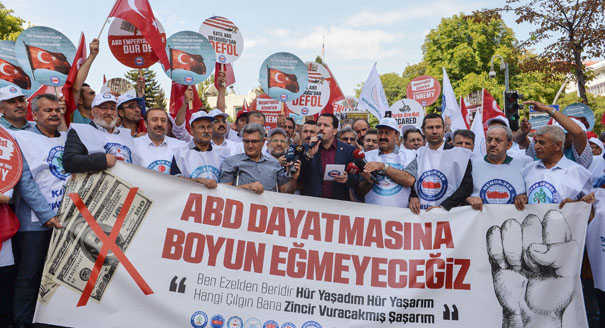Ibrahim Warde | Adjunct professor of international business at the Fletcher School, Tufts University, where he has worked on the Turkish economy
The landslide victory of the Islamist Justice and Development (AK) Party in November 2002 occurred as Turkey was implementing International Monetary Fund-imposed reforms following the 2001 financial crisis. Years of financial stability and uninterrupted growth erased memories of financial instability and recurring bailouts. A string of electoral victories kept Turkish President Recep Tayyip Erdogan in power and allowed him to consolidate his rule while playing an increasingly assertive role in regional if not global affairs. Turkey’s mercurial “sultan” has not hesitated to flex his military muscle in Syria and elsewhere, while deploying the country’s soft power throughout the Islamic world. Megaprojects designed to turn Turkey into one of the world’s ten largest economies have attracted foreign banks and international investors.
Although tensions had been building for months, the August 2018 crisis with the United States came as a shock. As Turkey’s economy falters, policies initiated in prosperous times are likely to be reassessed. Financial upheavals create winners and losers and thus recast the political system. The vaunted resilience of the “Anatolian Tigers”—a pillar of Erdogan’s support—will be tested. The informal and underground economies will expand, feeding suspicions of Gulenists, Kurds, and other suspected enemies of the regime and exacerbating authoritarian tendencies.
The turmoil is now reverberating throughout the region. It has heightened Middle Eastern tensions and further muddied the waters of the Syrian conflict. Relations with Saudi Arabia, Egypt, and the United Arab Emirates, already frayed due to Turkish support for the Muslim Brotherhood, have deteriorated further. As a result, the Turkish government has moved closer to Qatar and Iran.
Steven Cook | Eni Enrico Mattei senior fellow for Middle East and Africa studies at the Council on Foreign Relations
Since the United States imposed sanctions on two Turkish ministers in late July over their role in the detention of Andrew Brunson, a pastor from North Carolina, the rift between the United States and Turkey has steadily grown. President Donald Trump announced (via Twitter) that Washington was doubling tariffs on Turkish aluminum and steel. His advisors have warned that more sanctions are coming if Brunson is not released. In turn, Turkey’s President Recep Tayyip Erdogan has accused the United States of engaging in “economic warfare.”
All of this has stirred concern in American policy circles about the future of Turkish foreign policy, especially in the Middle East. Trump’s critics fear that he is driving Turkey away from the consensus within the North Atlantic alliance, but Ankara has been drifting away from its traditional allies for some time. In the Middle East, the Turks have worked at cross-purposes with the United States in Syria, Iran, Israel-Palestine, and Egypt. None of this is likely to change as a result of the fallout over Brunson. Some analysts fear that Turkey being “outside the tent” is more of a challenge than Ankara’s remaining inside it, albeit as a fractious ally. Turkey could intensify its ties with countries and groups that are enemies of the United States, but this would be a matter of degree. Ankara has already helped Iran evade sanctions, complicated the fight against the Islamic State in Syria, become Hamas’ patron, and sought to delegitimize the government of Egypt through its support for the Muslim Brotherhood.
Marc Pierini | Visiting scholar at Carnegie Europe, Brussels
The rift between U.S. President Donald Trump and his Turkish counterpart Recep Tayyip Erdogan has taken major proportions in the media because it is a rare confrontation between two allied leaders. And since both men are keen to make their personal feelings public, it flared up quickly. However, Middle East realities and strategic interests run much deeper than feelings.
Turkey’s policy in Syria will ultimately be defined by Russia’s goal of allowing Bashar al-Assad to retake control of the entire country. While Turkish military control of Afrin was temporarily permitted by Moscow, the battle for Idlib Governorate will be the next test. Later on, the fight to control the territories northeast of the Euphrates River will constitute the ultimate showdown between the Damascus-Moscow-Tehran coalition and the anti-Islamic State coalition led by the United States and including the People’s Protection Units of the Syrian Kurds. With which coalition Turkey will side is an open question at this stage.
On the strategic front, a complicating factor is the incompatibility between two military procurement decisions taken by Turkey: Its acquisition of Russian S400 missile systems and the U.S.-made F35 stealth fighter cannot go through without posing a major threat to the United States and NATO. Clarifications are needed.








